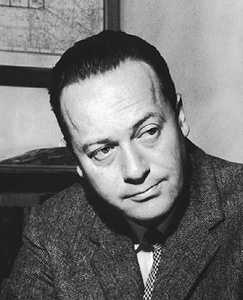The title of his book Trouble Follows Me, is From His Own Life

Part One—The Man
A child is just three when his father abandons him and his mother. His father fails to provide support. His mother, weakened by both physical and mental illness, is often bedridden. When he is six, his mother takes him to an orphanage, intending to abandon him. After a long period of indecision at the gate she reconsiders and takes him home again. Poverty and instability overshadow the child’s next fifteen years. The boy suffers a rootless upbringing in a foreign country, sometimes living with his mother and sometimes boarded with distant relatives. The one aunt with whom he forms a loving bond dies when he is twelve and he is shipped off to yet another strange city. By the time he reaches high school he has lived in fifty different places. He graduates high school in the middle of the Depression and can only find work as a farm hand. His father dies when he is seventeen. One day not long afterwards he comes home to find his mother’s body. He is now completely alone in the world.
This boy grows up to be:
A. A substance abuser
B. A serial killer
C. The writer of “the finest series of detective novels ever written by an American.”
Macdonald’s life was never easy. His books sold slowly during the first twenty years of his writing career. A biographer has calculated that one of his better-known books, The Moving Target, netted him only $3,000 to $4,400. Even though he was married to the successful novelist Margaret Millar, their combined earnings didn’t allow them to own a comfortable home until 1965, after twenty-seven years of marriage. Even then, the money came not from their writing but from the movie rights to The Moving Target, which was made into Harper with Paul Newman.
Middle age brought him more than a normal share of heartbreak. He had a deeply troubled marriage. They brought out the worst in each other and they might have found satisfaction if they had gone their separate ways. Given the level of tension in that household, it is not surprising that their only child, a daughter, carried burdens of her own. She killed a pedestrian while driving drunk. She and her father spent years in psychotherapy together. In 1959 she disappeared for ten days, setting off a widespread search. The ordeal undermined Macdonald’s health; after his daughter was located, he was hospitalized with cardiac distress, severe hypertension, and gout. His survival was in doubt. He was only 44 years old. His daughter died in 1970; shortly afterwards his wife’s eyesight began failing. His last book was published in 1976; by that time his wife was nearly blind. His memory began failing. In 1980 he was diagnosed with Alzheimer’s. He died in 1983. His only grandchild died of a drug overdose. The only mercy in this story is that, when it happened, Macdonald’s dementia was too far gone for him to realize.
If you have any comments you can email me at Dgarrett1948@ptd.net
Recent Comments